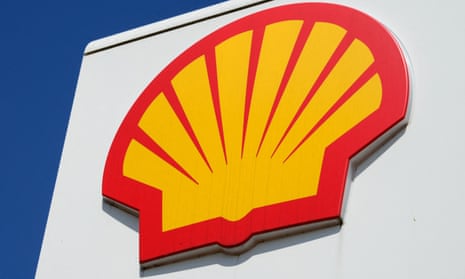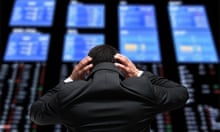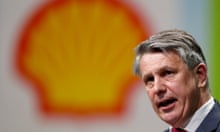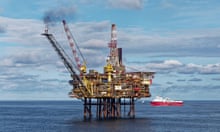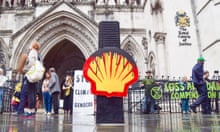Shell has revealed it expects to take a hit of about $2bn (£1.7bn) to its earnings for the final quarter of 2022 as a result of windfall taxes in the UK and EU.
The oil company sparked anger in October when it said it had not paid any UK windfall taxes because of its heavy investment in the North Sea.
On Friday, it said it expects to take a hit of $2bn to its earnings as a result of windfall taxes, bringing the total to nearly $2.4bn in the UK and EU combined.
The windfall levies are designed to capture excess earnings raked in as a result of high commodity prices, linked to Russia’s invasion of Ukraine.
Shell has not paid UK North Sea taxes since 2017 as it has received refunds on investments and decommissioning costs in the region.
In May, the government announced the windfall tax on the profit of oil and gas companies, with the chancellor, Jeremy Hunt, announcing in November this would be increased from an original 25% to 35%.
In the third quarter, Shell benefited from an 80% investment allowance linked to the UK windfall tax. This allowance was also reduced as part of the autumn budget.
Shell said it now expected to have paid between $4.3bn and $4.7bn in taxes across the world over the fourth quarter.
The new Shell chief executive, Wael Sawan, who was head of its integrated gas and renewables division, took over this week from longstanding boss Ben van Beurden.
Van Beurden surprised industry watchers in October when he said governments may need to tax energy companies to fund efforts to protect the “poorest” people from soaring bills.
He told an energy conference in London: “One way or another there needs to be government intervention. Protecting the poorest, that probably may then mean that governments need to tax people in this room to pay for it.”
after newsletter promotion
Russ Mould, an investment director at AJ Bell, said: “It would be disingenuous for Shell to gripe too much about these new levies given recently departed Ben van Beurden argued they were ‘inevitable’ back in October.
“Sawan faces a tough task as he looks to lead Shell through the next phase of the energy transition amid the sometimes competing aims of energy security and lower emissions.”
Shell posted bumper earnings through 2022 as the soaring price of wholesale natural gas fed through into its profits. It posted profits of $9.5bn in the third quarter of the year, doubled its earnings in the same period a year earlier but lower than the previous three months.
On Friday, the oil firm also revealed that it expected trading in its chemicals business to have been “significantly lower” in the final quarter of 2022 compared with the previous quarter.
It added that its liquefied natural gas production over the quarter was affected by outages at two plants in Australia.
